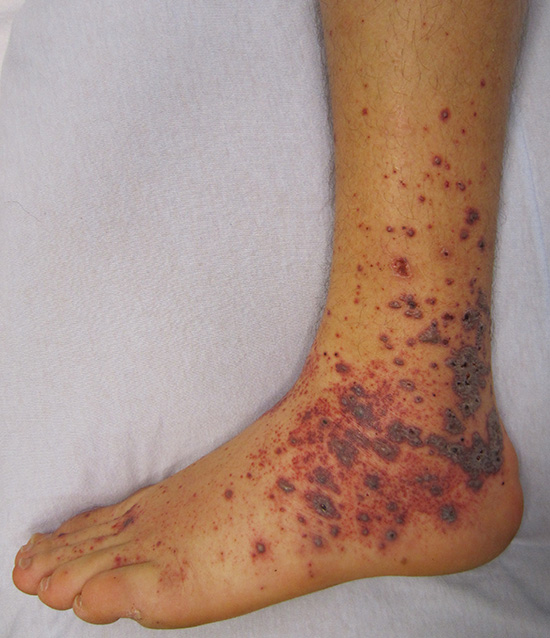Overcoming Dermatitis Herpetiformis
Dermatitis herpetiformis is a chronic skin condition. Once you break out in the characteristic rash, you can expect the symptoms to come and go repeatedly in the future. Learn why this diagnosis can be life changing, and what you can do to regain your health.
The rash is extremely itchy and appears as clusters of red bumps or blisters on your hands, feet, elbows, knees, buttocks, torso, or scalp. Symptoms are usually symmetrical, affecting both sides of the body.
It is not contagious and, despite its name, the condition is not at all related to the herpes virus.
People usually experience the onset of symptoms well into adulthood or in mid-life, but children and the elderly can have dermatitis herpetiformis as well. The condition is slightly more common in men than women.
No matter who you are, getting this sort of rash is beyond irritating, and getting this diagnosis is life-changing.
Connection To Celiac Disease
Most patients who are diagnosed with this skin condition also have celiac disease, which indicates an allergy to gluten in wheat protein.
Not all celiacs show obvious physical symptoms. It is considered a silent disease in most cases and can be difficult to diagnose based on digestive symptoms alone. For this reason, the 10% of celiacs who have dermatitis herpetiformis may be more fortunate.
Celiac disease can cause numerous problems if it goes untreated, including serious digestive issues. Malabsorption of vitamins and minerals in your diet can contribute to a host of health problems, like osteoporosis, anemia and lymphoma.
Although celiac disease was fairly uncommon in the past, more recent studies conducted in Europe estimate 1 in every 150-300 people have it.
Since a fraction of those with celiac disease have skin-related symptoms, we can assume the rates of dermatitis herpetiformis cases may be rising as well.
What Causes It?
While the onset of symptoms usually happens abruptly in adulthood, scientific research suggests there is a genetic component that predisposes some people to develop the skin condition.
Ultimately, the rash is an external symptom of an autoimmune reaction to gluten in the small intestine. Your body reacts to gluten as if it is hostile.
It seems very strange that your body would reject gluten when people throughout history have survived on bread and little else. It also seems odd that symptoms of a genetic condition would begin so late in life.
In the opinion of many doctors, there must be environmental factors contributing to the onset and to the increasing prevalence of these autoimmune disorders. Some suspects include:
- Processed or refined foods
- Bacterial and viral infections
- Genetically-modified crops
- Toxins in food, medicine and environment
- Decreased breastfeeding of infants
- High stress lifestyles
These factors may contribute to the rising number of cases associated with celiac disease, including dermatitis herpetiformis, over the past 60 years.
Of course, it is very difficult to study all of these factors. It could take several decades of comprehensive research to determine how much impact these things may have on a person's health, especially since some experts in the field of medicine deny the link completely.
Treating The Cause
Unlike many other skin problems, you can't eliminate the symptoms of dermatitis herpetiformis without treating the cause. This is something even the most pro-pharma doctors tend to agree on.
You can be prescribed a drug called dapsone to treat skin symptoms, but the condition is chronic. You would have to continue taking the drug indefinitely and at increased doses to manage your symptoms.
Dapsone can reduce itching within just a couple days, but it's unclear exactly why or how it works in relation to this skin condition which is not caused by bacteria.
Since the drug is known to adversely affect your blood, regular blood tests are almost always required when you start using it. Your liver might also be affected, sometimes causing jaundice.
Taking dapsone doesn't treat the underlying digestive issues, nor will it prevent them from leading to much more serious health problems.
This is why it is always recommended that patients with symptoms related to celiac disease maintain a gluten-free diet.
When you remove gluten from your diet, or at least reduce it as much as possible, your skin symptoms will clear up. It will improve your digestive system overall, helping to prevent issues caused by malnutrition associated with gluten-sensitive enteropathy.
Going Gluten-Free
Most people prefer quick and easy solutions to their problems, even their health problems, often choosing daily medication over lifestyle changes.
Hippocrates, the father of modern medicine, is quoted to have said: “Leave your drugs in the chemist's pot if you can cure the patient with food.”
Celiac disease is one of those illnesses that can be treated much more effectively with food than pharmaceutical chemicals.
It is difficult to determine what you should and shouldn't eat when you're trying to be gluten-free. You will of course have to stop eating wheat-based products, but you may also find there is gluten added to some medications you may be taking or even in the lip balm you use.
There is a growing community of people who are on a gluten-free diet, so you should be able to find information and support easily.
The trend is not another diet fad. More people are going gluten-free to treat various health problems like autoimmune diseases and inflammatory disorders, not because it's a hip trend.
Nutrition has an overwhelming impact on our health and well-being. Most of us have no idea what we're putting in our bodies.
Some people can get away with not paying attention to their diet, for a while. When you have symptoms related to celiac disease though, you have to learn what your own body is going to regard as junk.
As long as you maintain your diet, you will not have to suffer with dermatitis herpetiformis, but your symptoms may return if your gluten level exceeds what your body can handle.
All it takes is an increased level of awareness and development of healthy habits. Once those habits are established, you'll see positive results and never look back.
Home > Seborrheic Dermatitis > Dermatitis Herpetiformis









New! Comments
Share your thoughts about what you just read! Leave me a comment in the box below.